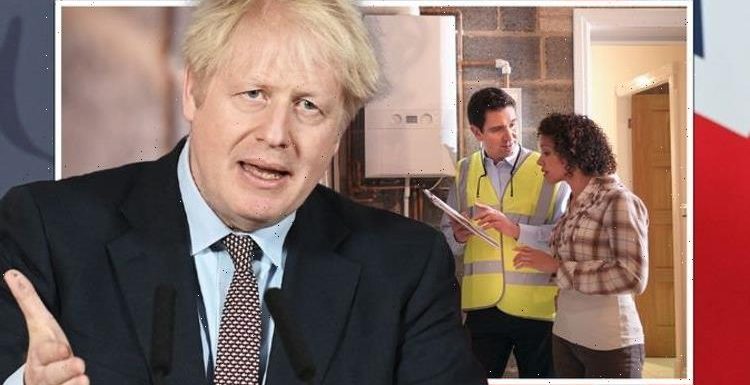
Conservative MP and host clash over deadline to ban gas boilers
We use your sign-up to provide content in ways you’ve consented to and to improve our understanding of you. This may include adverts from us and 3rd parties based on our understanding. You can unsubscribe at any time. More info
Tonight, the Department for Business, Energy and Industrial Strategy will announce the updated figures on greenhouse gases. Mr Johnson’s net-zero strategy not only promises to slash these but also to secure 440,000 well-paid jobs in green industries and secure £90billion in private investments by 2030. However, the Treasury has warned that this plan will cost the country about £1trillion over the next three decades.
While it is still not clear how these costs are going to be distributed, higher taxes and consumer prices are likely to contribute to the total sum.
In November, the Director of the Institute for Fiscal Studies Paul Johnson warned that the final bill would be “well over £1 trillion” that was previously stated.
He told BBC Radio 4’s Today programme: “What is interesting is that the Treasury’s view is that most of that won’t come from us the taxpayer, it will come via us as consumers or from industry though private investment.
“But this is a manageable cost because £1trillion is a lot, but over 30 years, and given the amount we invest in all sorts of things in any case, it is manageable. But it is a pretty substantial sum over that period.”
So, where could these costs hit the average Briton?


ELECTRIC VEHICLES
The Government has pledged a “£1billion commitment to support the electrification of UK vehicles and their supply chains”.
They have also committed a further £620million for local on-street residential charge points, along with a ban on the sale of new petrol and diesel cars by 2030
Even though the costs of electric vehicles are coming down, they are still much higher than comparable cars that run on an internal combustion engine.
For example, a Tesla Model 3 is estimated to be 45 percent more expensive than a comparable petrol car.

In comparison, the average cost of a non-luxury electric car (i.e. not a Tesla) is £26,965 in the UK.
However, with cheaper electric vehicles, battery manufacturing in the UK’s upcoming gigafactory and investment in building infrastructure suitable for these types of vehicles, more people may feel incentivised to buy ditch petrol cars.
BOILERS
The Government previously announced that it will ban builders from fitting conventional gas boilers in new homes by 2025, with the intention of banning the sale of all gas boilers by 2035.
The Government’s net zero strategy has included plans for a new £450million three-year Boiler Upgrade Scheme.
DON’T MISS:
Archaeology breakthrough as stunning Roman gladiator arena found [REVEAL]
Brexit Britain’s lithium goldmine could ‘replace oil’ and cut Russia [INSIGHT]
Putin furious as Germany BANS Russian gas and signs deal with Ukraine [SPOTLIGHT]


This scheme will offer households grants of up to £5,000 to install low-carbon heating systems, allowing them to cost the same as a gas boiler now.
However, this grant is not available to everyone, as only 90,000 vouchers are set to receive this grant.
This means that every other household will have to pay the full price of £10,000 if they want to instal a heat pump in their homes
ROAD PRICING
Given that the UK has promised to end the sale of petrol and diesel cars, the Treasury has warned that it would face a £37billion-a-year black hole due to a loss of revenue from fuel duty.
To make up for that loss, some have suggested introducing a tax on drivers based on where they drive or for how long.
Earlier this month, London’s Mayor Sadiq Khan announced that he will bring in more charges for motorists, in some form, by 2024.
Source: Read Full Article